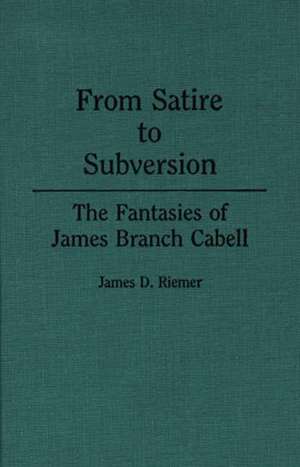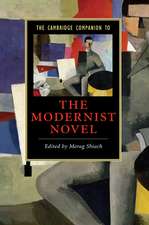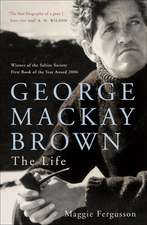From Satire to Subversion: The Fantasies of James Branch Cabell: Contributions to the Study of Science Fiction & Fantasy, cartea 38
Autor James D. Riemeren Limba Engleză Hardback – 30 iun 1989
During the recent resurgence of interest in Cabell's work, literary scholars have given the fantasy aspect of his novels only cursory consideration, assigning them a place in the popular high fantasy tradition established by William Morris. Riemer shows us a different and more innovative writer who, though drawing on the medieval, mythological, and folk sources associated with high fantasy, wrote in a darker, satirical vein that is closer in spirit to some of our postmodern writers. Rather than expressing an idealized, heroic view of the past, Cabell's work exploits the tension between those ideals and reality.
Raised on glamorous overblown tales of Confederate gallantry in the Civil War, Cabell realized very early in life that even the Arthurian generals of the Confederacy had human failings and that modern Richmond was a far cry from Camelot. His acute awareness of the discrepancies between myth and reality, and his perception that belief could invest myth with the substance and power of reality, became central to the issues Cabell explored through literary fantasy. Questioning the nature of reality, he satirized human behavior and commented dramatically on our frequent inability to make accurate distinctions between either the real and the illusory, or the real and the ideal. Though the fantasy novels were generally well received, some readers complained that Cabell's irreverence and humor betrayed a lack of respect for the true nature of the Middle Ages and its values. Riemer devotes a chapter to each of the major fantasy works on which Cabell's reputation rests. "Jurgen," which was banned briefly by the New York Society for the Suppression of Vice after its publication in 1919, is Cabell's best-known work. Other fantasy novels considered are "The Cream of the Jest," "Figures of Earth," "The High Place," "The Silver Stallion," and "Something about Eve." Riemer's study offers stimulating discussion and major new insights on a novelist whose works are deservedly regaining a wide readership. This book will be of interest for courses or studies in modern American fiction and fantasy fiction.
Din seria Contributions to the Study of Science Fiction & Fantasy
- 33%
 Preț: 320.87 lei
Preț: 320.87 lei - 38%
 Preț: 439.17 lei
Preț: 439.17 lei - 52%
 Preț: 251.27 lei
Preț: 251.27 lei - 35%
 Preț: 364.06 lei
Preț: 364.06 lei - 23%
 Preț: 560.69 lei
Preț: 560.69 lei - 38%
 Preț: 437.24 lei
Preț: 437.24 lei - 38%
 Preț: 346.00 lei
Preț: 346.00 lei - 28%
 Preț: 462.70 lei
Preț: 462.70 lei - 24%
 Preț: 363.46 lei
Preț: 363.46 lei - 24%
 Preț: 462.03 lei
Preț: 462.03 lei - 52%
 Preț: 251.63 lei
Preț: 251.63 lei - 38%
 Preț: 438.07 lei
Preț: 438.07 lei - 38%
 Preț: 437.91 lei
Preț: 437.91 lei - 39%
 Preț: 432.59 lei
Preț: 432.59 lei - 26%
 Preț: 354.00 lei
Preț: 354.00 lei - 31%
 Preț: 285.66 lei
Preț: 285.66 lei - 38%
 Preț: 345.07 lei
Preț: 345.07 lei - 38%
 Preț: 438.41 lei
Preț: 438.41 lei - 38%
 Preț: 345.58 lei
Preț: 345.58 lei - 24%
 Preț: 459.75 lei
Preț: 459.75 lei - 38%
 Preț: 343.71 lei
Preț: 343.71 lei - 24%
 Preț: 459.68 lei
Preț: 459.68 lei - 27%
 Preț: 440.61 lei
Preț: 440.61 lei - 34%
 Preț: 319.38 lei
Preț: 319.38 lei - 38%
 Preț: 438.17 lei
Preț: 438.17 lei - 26%
 Preț: 533.72 lei
Preț: 533.72 lei - 38%
 Preț: 437.91 lei
Preț: 437.91 lei - 55%
 Preț: 149.52 lei
Preț: 149.52 lei - 42%
 Preț: 252.95 lei
Preț: 252.95 lei - 28%
 Preț: 435.37 lei
Preț: 435.37 lei - 33%
 Preț: 320.42 lei
Preț: 320.42 lei - 33%
 Preț: 319.75 lei
Preț: 319.75 lei - 27%
 Preț: 441.71 lei
Preț: 441.71 lei - 38%
 Preț: 345.74 lei
Preț: 345.74 lei - 38%
 Preț: 437.15 lei
Preț: 437.15 lei - 39%
 Preț: 433.36 lei
Preț: 433.36 lei - 38%
 Preț: 440.11 lei
Preț: 440.11 lei - 18%
 Preț: 320.60 lei
Preț: 320.60 lei - 38%
 Preț: 343.71 lei
Preț: 343.71 lei - 27%
 Preț: 346.42 lei
Preț: 346.42 lei
Preț: 361.36 lei
Preț vechi: 477.35 lei
-24% Nou
69.14€ • 72.39$ • 57.21£
Carte tipărită la comandă
Livrare economică 05-19 aprilie
Specificații
ISBN-10: 0313255695
Pagini: 128
Dimensiuni: 140 x 216 x 11 mm
Greutate: 0.31 kg
Ediția:New.
Editura: Praeger Publishers
Seria Contributions to the Study of Science Fiction & Fantasy
Descriere
Raised on glamorous overblown tales of Confederate gallantry in the Civil War, Cabell realized very early in life that even the Arthurian generals of the Confederacy had human failings and that modern Richmond was a far cry from Camelot. His acute awareness of the discrepancies between myth and reality, and his perception that belief could invest myth with the substance and power of reality, became central to the issues Cabell explored through literary fantasy. Questioning the nature of reality, he satirized human behavior and commented dramatically on our frequent inability to make accurate distinctions between either the real and the illusory, or the real and the ideal. Though the fantasy novels were generally well received, some readers complained that Cabell's irreverence and humor betrayed a lack of respect for the true nature of the Middle Ages and its values. Riemer devotes a chapter to each of the major fantasy works on which Cabell's reputation rests. Jurgen, which was banned briefly by the New York Society for the Suppression of Vice after its publication in 1919, is Cabell's best-known work. Other fantasy novels considered are The Cream of the Jest, Figures of Earth, The High Place, The Silver Stallion, and Something about Eve. Riemer's study offers stimulating discussion and major new insights on a novelist whose works are deservedly regaining a wide readership. This book will be of interest for courses or studies in modern American fiction and fantasy fiction.















